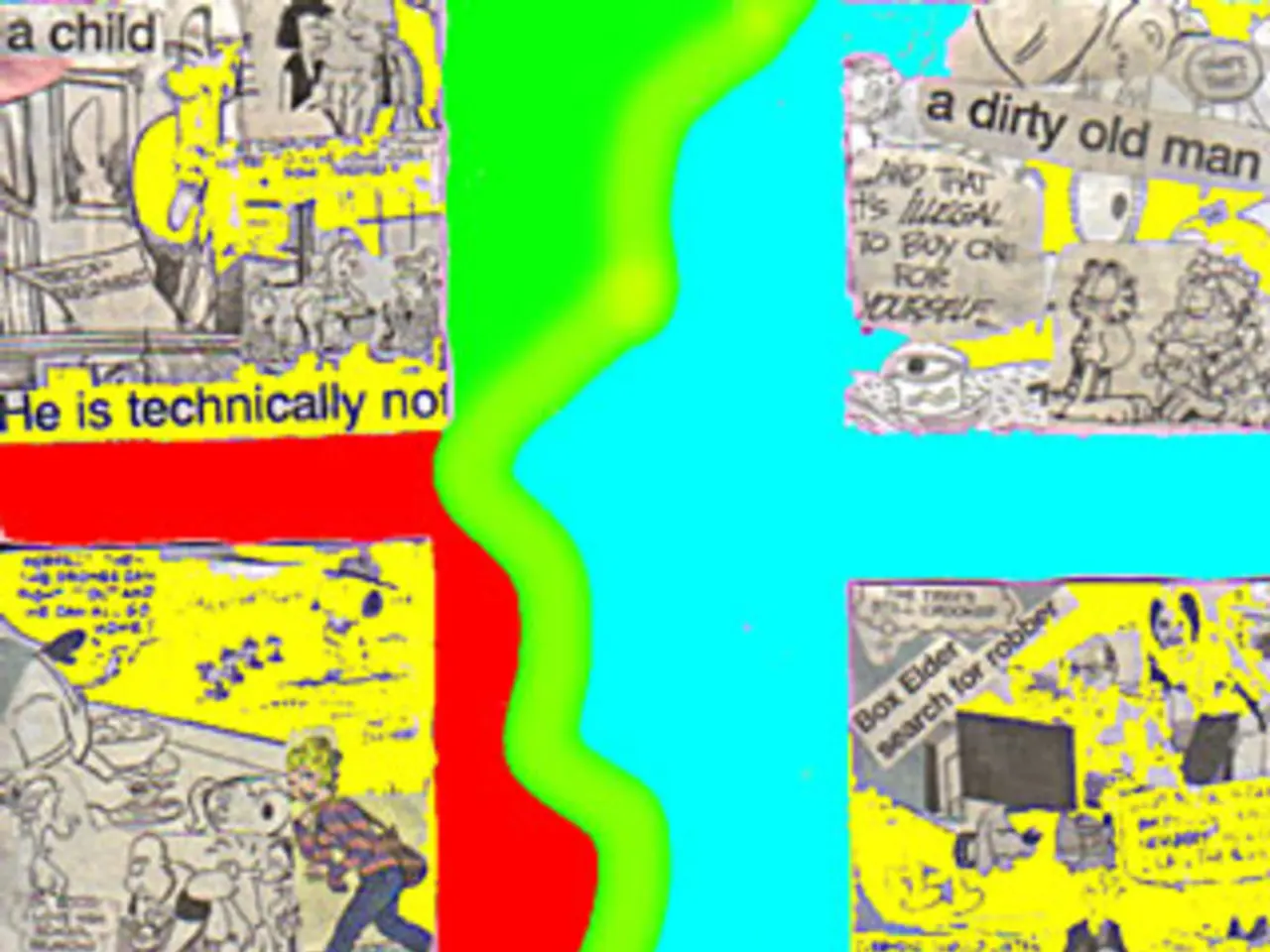Takashi Miike's film "Sham" delves into the gray area between reality and deception
In the realm of Japanese cinema, director Takashi Miike's latest offering, Sham, stands out as a thought-provoking drama that delves into complex social issues. Based on a 2003 court case in Fukuoka involving an elementary school teacher accused of abusing a student, the film presents a captivating narrative that challenges the boundaries between truth and fiction [1][2][3].
At the heart of the story is the character of elementary school teacher Yabushita, portrayed by Ayano Gō, who finds herself embroiled in a scandal of physical, emotional, and alleged racial abuse. However, the accusations were later revealed to be fabricated during the trial, making Yabushita a victim of false allegations that had generated sensational media coverage [5].
The film draws from Masumi Fukuda's 2007 investigative journalism book, "Fabrication: The Truth About The ‘Murder Teacher’ in Fukuoka," which delves deep into the case and the media frenzy surrounding it [1][5]. Miike deliberately blurs the line between truth and fiction, raising questions about the nature of truth and who controls its narrative [1][4].
Miike himself is cautious about claiming the film is strictly "based on a true story," emphasizing the difficulty of definitively uncovering truth in such a fraught and complex social and legal situation [1]. The case presents a myriad of societal issues, including media influence, overprotective parenting, racial prejudice, and the justice system's handling of abuse allegations [1][4].
In Sham, the narrative unfolds as Takuto's parents accuse Yabushita of escalating abuse, from verbal racism to physical violence. The boy's mother, Ritsuko, contacts tabloid reporter Narumi, played by Kamenashi Kazuya, who begins hounding Yabushita. Narumi's reporting shapes public opinion in deciding what happened and who was at fault [4].
Kobayashi Kaoru delivers an outstanding performance as Lawyer Yugamidani, who takes over Yabushita's case. Miike's approach to acting results in a dance between two masters, with Shibasaki Kō and Ayano Gō delivering impressive performances [2].
The film's tone is quiet and sombre, standing in stark opposition to Miike's most famous works. It lacks the extreme brutality or supernatural elements found in some of Miike's past works, but offers a uniquely "Miike-esque" experience [3]. The trailer for the film is available in Japanese [6].
Sham weaves together topics such as education, bullying, PTSD, overbearing parents, and the role of the news media, providing a compelling exploration of truth, storytelling, and the power of media in shaping public opinion [1]. Miike's hands-off approach to actors allows them to perform naturally, without overacting [2]. The cast delivers pitch-perfect performances, keeping the audience engaged for the film's two-hour-plus running time [2].
If you're a fan of Miike's work or are intrigued by the complex interplay between truth, media sensationalism, and personal perspectives in a scandal, Sham is a must-watch. The film is a testament to Miike's skill as a director and offers a thought-provoking exploration of a real-life inspired story that highlights the complexities of truth and justice in a society [1][5].
[1] https://www.japantimes.co.jp/culture/2018/08/03/films/sham-review-takashi-miike-film-based-on-2003-court-case-in-fukuoka/#.YtG1pVZByUk [2] https://www.japantimes.co.jp/culture/2018/08/03/films/sham-review-takashi-miike-film-based-on-2003-court-case-in-fukuoka/#.YtG1pVZByUk [3] https://www.japantimes.co.jp/culture/2018/08/03/films/sham-review-takashi-miike-film-based-on-2003-court-case-in-fukuoka/#.YtG1pVZByUk [4] https://www.japantimes.co.jp/culture/2018/08/03/films/sham-review-takashi-miike-film-based-on-2003-court-case-in-fukuoka/#.YtG1pVZByUk [5] https://www.japantimes.co.jp/culture/2018/08/03/films/sham-review-takashi-miike-film-based-on-2003-court-case-in-fukuoka/#.YtG1pVZByUk [6] https://www.youtube.com/watch?v=b3z8M99zQAw (Japanese trailer for Sham)
- The global media community can connect and share insights about the power of media in shaping public opinion through a discussion of the Japanese film, Sham, directed by Takashi Miike.
- Businesses interested in education or entertainment sectors might find it profitable to study the themes present in Sham, such as bullying, PTSD, overbearing parents, and the influence of the news media.
- Fans of movies-and-tv productions featuring interviews and real-life inspired stories may wish to access the Japanese trailer for Sham online to get a sneak peek into the film.
- The captivating storyline of Sham could be adapted into a television series, offering audiences a deeper, ongoing exploration of complex social issues like racial prejudice, the justice system, and the impact of media sensationalism on personal perspectives.
- In the realm of entertainment, Sham provides an opportunity for photojournalists and documentarians to delve into the complex interplay between truth, media sensationalism, and personal narratives, potentially inspiring thought-provoking documentaries or photo essays.








